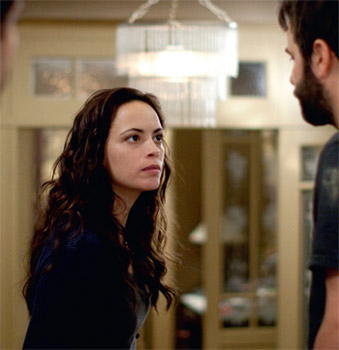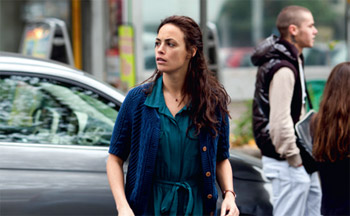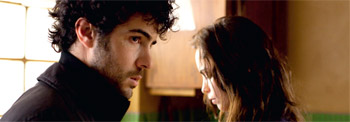Tahar Rahim The Past Interview

Tahar Rahim The Past Interview
Cast: Bérénice Bejo, Tahar Rahim, Ali Mosaffa, Pauline Burlet, Elyes Aguis, Jeanne Jestin, Sabrina Ouazani, Babak Karimi, Valeria Cavalli
Director: Asghar Farhadi
Genre: Drama, Mystery
Rated: PG
Running Time: 130 minutes
Synopsis: Following a four year separation, Ahmad returns to Paris from Tehran, upon his French wife Marie's request, in order to finalise their divorce procedure. During his brief stay, Ahmad discovers the conflicting nature of Marie's relationship with her daughter Lucie. Ahmad's efforts to improve this relationship soon unveil a secret from their past.
The Past
Release Date: February 6th, 2014
Interview with Tahar Rahim
Question: Initially, you were due to make another film with Asghar Farhadi. What was that, and what happened?
Tahar Rahim: Asghar had seen A Prophet, and he told me that was why he wanted to work with me. We met up and he told me about this project. It seems quite a while ago now, but I remember there was a man and a woman who fell in love over the internet. The writing came up against a specific problem: the use of a webcam. Anyway, we were supposed to see each other three weeks later, and during this meeting he told me the plot of The Past. I asked about the other film. He replied that he'd rather make this one, because it was more personal for him. It came as a surprise, but since we hadn't yet started working…
Question: Why did he choose you?
Tahar Rahim: I don't know exactly. But I think Asghar chooses actors for their 'modeling clay" potential. I think he likes to transform people. He's not interested in taking an actor and just asking him to do what he's done before, and he's right. What's more, he wanted to wash me clean of all my previous roles. He had seen all my films and it was obsessive. It went right down to the detail of the costumes. Sometimes I would wear a jacket a bit like one I'd worn in another film, and he'd say, 'No, I've seen that before, I don't want that."
 Question: Did Asghar talk to you about your origins?
Question: Did Asghar talk to you about your origins?Tahar Rahim: We touched on the subject, and we agreed: the film shouldn't be about that. The film is like what society is like today in France – how we go through it with our highs and our lows, but with no question of cultural heritage, of being a couple from an immigrant background, and so on. Asghar understood that the country has moved beyond that.
Question: How would you describe the character of Samir?
Tahar Rahim: As a man who's tired of life. He is hung-up on his guilt, caught between a love which still lasts and a new love – between a past life and the desire to move on to a future life. And I think he's a guy who really is constantly depressed, but who keeps it all inside. He hangs on, and that's a sign of his maturity. He's a bit older than me – in his thirties – and he's taken a few knocks in life. No doubt this has aged him more quickly. Asghar transformed me, making my hair a little gray. I adopted a slightly heavy gait, and slower movements, whereas normally I'm much fleeter of foot.
Question: Did you see the character like that right away?
Tahar Rahim: To begin with, I imagined him more smiley, more into the spontaneity of the good things in life. But Asghar saw him differently. We talked about it a lot. For him, it was a character very like the father in Bicycle Thief. Asghar asked me to watch De Sica's film. He wanted me to understand the almost adult relationship that a father can have with a child. My nature and my own upbringing made me gravitate towards someone more upbeat, but in the end, Asghar was right.
Question: Was the long rehearsal process something new for you?
Question: What did the rehearsals bring to you?
Tahar Rahim: They helped me understand my character better, and helped me adapt to how the shoot was going to be using Asghar's method. They also allowed me to probe a bit more around the important issues in the script and the relationships between the characters. Perhaps most important was discovering how the script, and the story itself, would be enhanced by the directing. Things emerged during rehearsals that didn't exist in the script, notably the emotional relationships between the characters. Everything became more complex than what I had come to expect from the readings.
Question: With Asghar, did you think about what Samir's past might have been?
Tahar Rahim: Yes, we did a lot of work on that subject. I remember one exercise: Asghar asked me how I met my wife, what she was like physically, and the exercise was all the more interesting given that I hadn't prepared for it. It was really improvised. We also did some memory exercises to learn how to look at each other carefully. I had to look at the young actor who plays my son for 30 seconds, then we had to stand back-to-back and describe exactly which clothes we were wearing, the feature of each other's face, and so on. These are exercises from Asghar's previous work as a theater director, and it's very important to know the characters biographical elements and to integrate them, so you don't think about them during the shoot. That allowed me to be immersed in another life.
Question: During rehearsals, did you also invent how Samir and Marie had met?
Tahar Rahim: Yes, it was quite simply when he went to fetch his wife's medication from that pharmacist. In moments of distress like these, welcoming arms can be either dangerous or life-saving, it all depends. Marie also came to bring her laundry to the dry cleaners and Samir found someone to talk to in those moments. That's how life goes.
 Question: On the set, how did you adapt to Asghar Farhadi's very meticulous way of working?
Question: On the set, how did you adapt to Asghar Farhadi's very meticulous way of working?Tahar Rahim: I just adapted! With me, the energy always dissipates at a given moment – I can't remain in a constant state all the time, that's impossible. My way of decompressing is to relax between takes. And when I have to do a difficult scene and I have to stay concentrated, you really have to catch it quick because it's hard to remain sincere and honest in an emotion. I remember a detail which illustrates Asghar's precision. It was one of the final scenes in the film: Samir is seen through a little window in a door. I had been raised up a bit to achieve the composition that Asghar wanted. Then they did the reverse shot, which was quite a wide shot in which I'm seen from behind, and then, obviously, they had to remove the little plates on which I'd been standing. Asghar asked me to take two steps back so that the perspective gave the right impression, making it seem as though I was in the same place. No one else would have noticed, but for him it was important.
Question: What are the main sentiments that motivate Samir? Sadness? Guilt?
Tahar Rahim: Both, and I think also indecision. And beyond these three sentiments, there's love too, of course, because if there were no love involved, his case would be quickly resolved. Love sometimes leads to complex situations like this one.
Question: What is the role of Ahmad's character, in your view?
Tahar Rahim: He's a catalyst, and in the end, he makes Samir and Marie bond. Sometimes, you can be in a fog, and until you get a jolt, you can't move forward. It can be necessary for an outside element to restore dialog when it has become impossible.
Question: Samir doesn't show any open animosity towards Ahmad, nor show any real signs of affection towards Marie: is that what Asghar Farhadi asked of you?
Tahar Rahim: Yes, it was a precise request. I tended to show a bit more, to try and be more amiable. But Asghar didn't want that. He was right, given Samir's situation: he lives with a sick person, with whom he can no longer really communicate. He's in limbo, and that prevents him from attaining happiness. Once again, Asghar is the most meticulous filmmaker with whom I've worked. Thanks to him, it's the first time I have brought together the internal work with the external. When I say external, I mean the scenography of the theater; for example very precise movements, almost choreographed. Sometimes, Asghar is a bit like a puppeteer who'd like to give life to his puppets. And I like that, when I feel confident.
The Past
Release Date: February 6th, 2014
MORE





